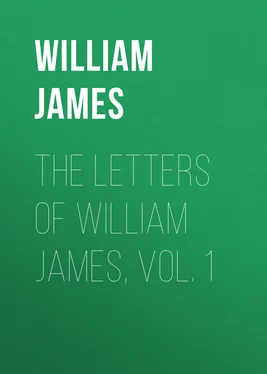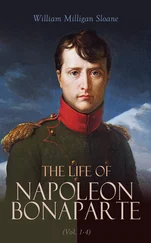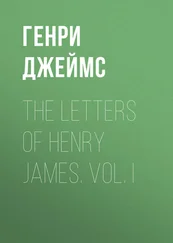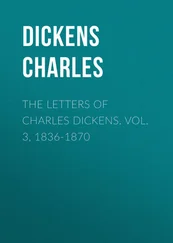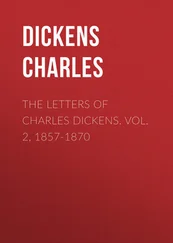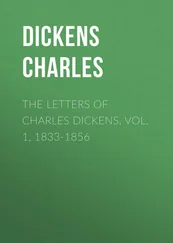William James - The Letters of William James, Vol. 1
Здесь есть возможность читать онлайн «William James - The Letters of William James, Vol. 1» — ознакомительный отрывок электронной книги совершенно бесплатно, а после прочтения отрывка купить полную версию. В некоторых случаях можно слушать аудио, скачать через торрент в формате fb2 и присутствует краткое содержание. Жанр: Биографии и Мемуары, Философия, foreign_edu, foreign_antique, на английском языке. Описание произведения, (предисловие) а так же отзывы посетителей доступны на портале библиотеки ЛибКат.
- Название:The Letters of William James, Vol. 1
- Автор:
- Жанр:
- Год:неизвестен
- ISBN:нет данных
- Рейтинг книги:5 / 5. Голосов: 1
-
Избранное:Добавить в избранное
- Отзывы:
-
Ваша оценка:
- 100
- 1
- 2
- 3
- 4
- 5
The Letters of William James, Vol. 1: краткое содержание, описание и аннотация
Предлагаем к чтению аннотацию, описание, краткое содержание или предисловие (зависит от того, что написал сам автор книги «The Letters of William James, Vol. 1»). Если вы не нашли необходимую информацию о книге — напишите в комментариях, мы постараемся отыскать её.
The Letters of William James, Vol. 1 — читать онлайн ознакомительный отрывок
Ниже представлен текст книги, разбитый по страницам. Система сохранения места последней прочитанной страницы, позволяет с удобством читать онлайн бесплатно книгу «The Letters of William James, Vol. 1», без необходимости каждый раз заново искать на чём Вы остановились. Поставьте закладку, и сможете в любой момент перейти на страницу, на которой закончили чтение.
Интервал:
Закладка:
For James was perennially "keen" about new things and future things, about beginnings and promises. His mind looked forward eagerly. Youth never bored him. Anything spontaneous, young, or original was likely to excite him. And then he would pour out expressions of approval and acclaim. Brilliant students and young authors were often "little geniuses"; he guessed that they would "produce something very big before long"; they had already arrived at "an important vision," or had "driven their spear into the Universe where its ribs are short"; they were going to make "perhaps the most original contribution to philosophy that anyone had made for a generation."
It must be admitted that his recognition would occasionally have had a happier effect had it been less encouraging. But he enjoyed being generous and hated to spoil a gift of praise by "stingy" qualifications. He might have said that the great point was not to let any unique virtue in a man evaporate or be wasted. At any rate, he said, that should be seen to in a university. He was quite unconventional in recognizing originality, and preferred all the risks involved in hailing potentialities that might never come to fruition, to a policy of playing safe in his estimates. Yet on the whole he very seldom "fooled himself." Few men who have possessed a comparable gift of discovering special virtues in different individuals have combined with it so just a sense of what could not be expected of those same individuals in the way of other virtues.
But there would be danger of misunderstanding if this trait were mentioned without an important qualification. The reader will do well, in interpreting any judgment of James's to consider whether the book, or theory, or man under consideration was new and unrecognized, or was already established and secure of a place in men's esteem. In the former case, especially if there was anything in the situation to appeal to James's natural "inclination to succor the under-dog," his praise was likely to be extravagantly expressed and his reservations were apt to be withheld. In the latter case he was no less certain to give free rein to his critical discernment. Men who knew him as a teacher are likely to remember how he encouraged them in their efforts on the one hand, and on the other how stimulating to them and enlarging to their mental horizons were his free and often destructive comments upon famous books and illustrious men.
As a teacher at Harvard for thirty-five years, he influenced the lives and thoughts of more than a generation of students who sat in his classes. To many of them he was an adviser as well as a teacher, and to some he was a lifelong friend. Such was the character of his books and public discourses that people of all sorts and conditions from outside the University came to him or wrote to him for encouragement and counsel. The burden of his message to all was the bracing text which he himself loved and lived by—"Son of man, stand upon thy feet and I will speak unto thee." He never tried to win disciples, to compel allegiance to his own doctrines, or to found a school. But he taught countless young men to love philosophy, and helped many a troubled soul besides to face the problems of the universe in an independent and gallant spirit. He helped them by example as well as by precept, for it was plain to everyone who knew him or read him that his genius was ardently adventurous and humane.
II
1861-1864
IN the autumn of 1861 James turned to scientific work, and began what was to become a lifelong connection with Cambridge and Harvard University by registering for the study of chemistry in the Lawrence Scientific School. Among the students who were in the School in his time were several who were to be his friends and colleagues in later years—Nathaniel S. Shaler, later Professor of Geology and Dean of the Scientific School, Alexander Agassiz, engineer, captain of industry, eminent biologist, and organizer of the museum that his father had founded, the entomologist Samuel H. Scudder, F. W. Putnam, who afterwards became Curator of the Peabody Museum of Ethnology and Anthropology, and Alpheus Hyatt, the palæontologist, who was Curator of the Museum of Comparative Zoölogy at Harvard for many years before his death in 1902. The chemical laboratory of the school had just been placed under the charge of Charles W. Eliot,—in 1869 to become President Eliot,—who writes: "I first came in contact with William James in the academic year 1861-62. As I was young and inexperienced, it was fortunate for me that there were but fifteen students of chemistry in the Scientific School that year, and that I was therefore able to devote a good deal of attention to the laboratory work of each student. The instruction was given chiefly in the laboratory and was therefore individual. James was a very interesting and agreeable pupil, but was not wholly devoted to the study of Chemistry. During the two years in which he was registered as a student in Chemistry, his work was much interfered with by ill-health, or rather by something which I imagined to be a delicacy of nervous constitution. His excursions into other sciences and realms of thought were not infrequent; his mind was excursive, and he liked experimenting, particularly novel experimenting.... I received a distinct impression that he possessed unusual mental powers, remarkable spirituality, and great personal charm. 19 19 The following entries occur among some "notes on his students" which President Eliot made at the time—
This impression became later useful to Harvard University."
Henry James published many of the few still existing letters which William wrote during this time in his "Notes of a Son and Brother." Three of them are among the first six selected for inclusion here. The fun and extravagance of these early letters is so full of an intimate raillery that they should be read in their context in that book, where the whole family has been made to live again. The first of the letters that follow was written a few weeks after the opening of the autumn term in which James began his course in chemistry. The son of Professor Benjamin Peirce (the mathematician) of whom it makes mention was the brilliant but erratic Charles S. Peirce, to whom other references appear in later letters, and whose name James subsequently associated with his pragmatism. "Harry," "Wilky" and "Bobby" will be recognized as William's younger brothers. Wilky was at the Sanborn School in Concord, thirteen miles away. Bobby was in Newport, under the parental roof at 13 Kay Street. The Emerson referred to was R. W. Emerson's son, Edward W. Emerson, and "Tom" Ward, the Thomas W. Ward of a lifelong friendship and of several later letters and allusions.
To his Family
DEAREST FAMILY,—This morning, as I was busy over the tenth page of a letter to Wilky, in he popped and made my labor of no account. I had intended to go and see him yesterday, but concluded to delay as I had plenty of work to do and did not wish to take the relish off the visits by making them frequent when I was not home-sick. Moreover, Emerson and Tom Ward were going on, and I thought he would have too much of a good thing. But he walked over this morning with, or rather without them, for he went astray and arrived very hot and dusty. I gave him a bath and took him to dinner and he is now gone to see [Andrew?] Robeson and Emerson. His plump corpusculus looks as always. He says it is pretty lonely at Concord and he misses Bob's lively and sportive wiles very much in the long and lone and dreary evenings, tho' he consoles himself by thinking he will have a great time at study. I have at last got to feel quite settled and homelike. I write in my new parlor whither I moved yesterday. You have no idea what an improvement it is on the old affair, worth double the price, and the little bedroom under the roof is perfectly delicious, with a charming outlook upon little backyards with trees and pretty old brick walls. The sun is upon this room from earliest dawn till late in the afternoon—a capital thing in winter.
Читать дальшеИнтервал:
Закладка:
Похожие книги на «The Letters of William James, Vol. 1»
Представляем Вашему вниманию похожие книги на «The Letters of William James, Vol. 1» списком для выбора. Мы отобрали схожую по названию и смыслу литературу в надежде предоставить читателям больше вариантов отыскать новые, интересные, ещё непрочитанные произведения.
Обсуждение, отзывы о книге «The Letters of William James, Vol. 1» и просто собственные мнения читателей. Оставьте ваши комментарии, напишите, что Вы думаете о произведении, его смысле или главных героях. Укажите что конкретно понравилось, а что нет, и почему Вы так считаете.
